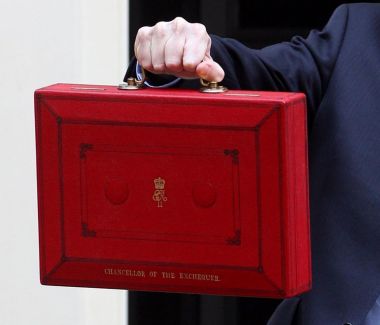A Budget to make work pay

Christian leaders and charities have been making their views known today in anticipation of George Osborne's 2014 budget.
As the Chancellor of the Exchequer sets the country's course for the coming financial year, Right Reverend Nick McKinnel, the Bishop of Crediton, called on the Government to do more for families on low incomes.
Speaking in the Mid Devon Gazette, Bishop McKinnel said: "I'd like to see firm evidence in the Budget that the Government is rethinking its support for the most vulnerable in society, and putting in more safeguards to protect people.
"Here in Devon I've seen through my visits to food banks and charities how volunteers and voluntary groups, many of them Christian, are picking up the pieces for people for whom the welfare state is no longer the safety net it should be.
"Many of those who are driven to depend on food banks are hardworking people stuck on low pay."
The Right Reverend Tim Thornton, the Bishop of Truro, has called on the Government to recognise how being in work is not enough to escape poverty anymore.
Quoted in the Western Morning News, Bishop Thornton said: "Nearly two-thirds of children in poverty have parents who are in work, so it is vital that the Government begins seriously to address the growing problem of in-work poverty."
He acknowledged that employers have a role to play, arguing that they should aim to be "providing secure, meaningful employment, a living wage, and opportunities for progression".
However, he put the onus on Mr Osborne and his colleagues to use the tools they have at their disposal to raise more people out of poverty. Specifically, he referred to in-work benefits: "Government needs to recognise the vital role played by in-work benefits in helping to lift many families with children out of poverty."
He spoke about the dangers of the changes to the welfare system, and how in-work benefits are being "eroded in real terms by recent welfare cuts"
Specifically, he singled out the 1% uprating policy, Osborne's plan to increase the amount in benefit payments by only 1% per year. Because UK inflation currently stands at around 2.2%, a rise of 1% a year would make the value of benefit payments decrease unless inflation drops.
"We want to see things that will help people on low wages because their the ones who don't have enough to cover the out of the ordinary things, or even just their regular budget."
Speaking to Christian Today, Jennifer Herrera of the Church of England's Acts 435 charity said: "We're hoping for an increase in the minimum wage. Of course we would love it to go up to a living wage, but any increase at all is welcome."
Ms Herrera praised the Government's plans to increase the amount of untaxed income from its current level of £10,000.
"We're pleased about the news of the increase in the individual tax allowance, that will have good knock on effects for those on low wages.
"What we're finding is that people who have got jobs just aren't earning enough."
Chris Mould, Director of the food bank charity, the Trussell Trust, speaking on the Huffington Post's blog today, also focused attention on the plight of the working poor.
"Many people attending foodbanks have jobs. Too often those jobs are insecure, with uncertain hours. The 'zero hours contract' world may help kick start growth, but it doesn't usually help people out of poverty," he said.
"Poor people need better base pay, more employment security, more full time rather than part time work."
Talking about who could best work to solve this problem, Mr Mould suggested that local government had the primary responsibility.
"Local authorities have been given greater responsibility for supporting people in crisis and we have seen many creative approaches in 2013 as a result of this devolution.
"More resources in the hands of local authorities, well managed, would mean more local capacity to help people in crisis and better public services to support low earners: for example cheaper travel to work and more low cost housing.
Simon Barrow, co-director of the Christian political think-tank Ekklesia, said budgets were about more than just numbers.
"Budgets, we believe, are moral documents. They are not just about abstract figures. They indicate the priorities and vision of a society and the choices facing its elected leaders," he said.
Criticising the foundation of the Government's policies so far, Mr Barrow said: "Austerity is not a credible economic policy, it is a flawed ideology. We need to invest in change, not cut support for the most vulnerable while bailing out the wealthiest.
"Economic, monetary and fiscal policies need to be pro-social and pro-environment, because they are about how we share and use our resources. Democratic accountability is also vital."
In a bold demand shared with Christian Today, director of Church Action on Poverty Niall Cooper called on George Osborne to "deliver an 'End Hunger Budget'".
"With upwards of half a million people forced to turn to foodbanks in the past six months alone it is imperative that the Chancellor finds ways to ease the pressure on household budgets for all those in communities up and down the country who are struggling to make ends meet, and to literally put food on the table for themselves and their families - whether they are in work or not," he said.











